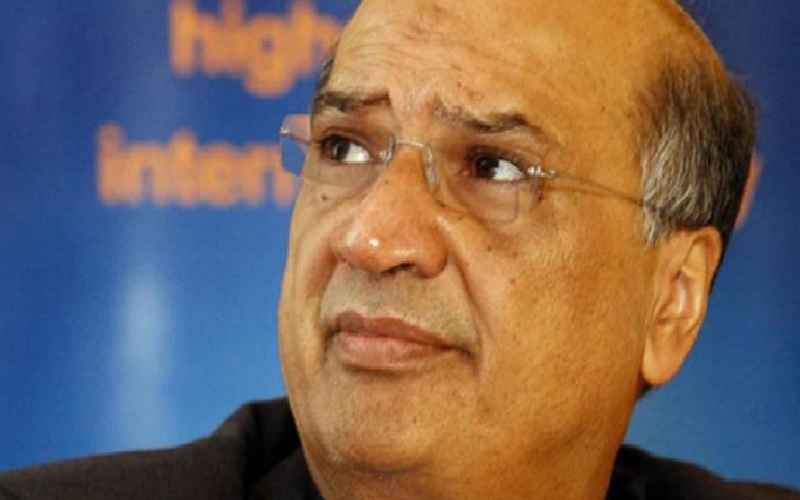
Sameer Africa, the company that promised to “take you there” with dependable tyres built for African roads has thrown in the towel.
Sameer’s exit from the tyre business adds to a growing pile of failed ventures by billionaire Naushad Merali (pictured), one of Kenya’s shrewd deal makers. But equally, a number of deals has turned him into one of the richest men in East and Central Africa.
He is the man famed for holding the record for the biggest profit ever made in the shortest time in Kenya’s corporate history, a telecommunications deal that earned him Sh1.6 billion in just an hour.
For keen observers of the reclusive businessman’s business undertakings, the exit from the loss-making tyre venture had been a long time coming. The firm is the latest victim of cheap imports after Eveready and Cadbury.
The firm largely blames its woes on imports from India and China, which have flooded the market. The move will send an undisclosed number of workers home.
Sameer, which has been trading on the Nairobi Securities Exchange since 1995, said cheap and subsidised tyre imports have eaten into its market share, hitting its earnings hard.
The business is estimated to have incurred losses amounting to over Sh1 billion in the last two years.
Merali, who’s worth is Sh39 billion ($370 million), according to Forbes 2015 Africa’s Richest report, has a knack for making quick divestitures from businesses showing weak financial performance.
In 2015, he sold Equatorial Commercial Bank (ECB) to Mwalimu Savings and Credit Society, which after the change of ownership, struggled to perform.
The bank was later named Spire Bank and has caused the Sacco endless woes even after the new owners injected Sh6 billion to shore it up.
Merali was also a top shareholder of Kenya Data Networks (KDN), selling a substantial stake as the company continued to encounter financial difficulties.
His Sameer Group also sold East African Cables to TransCentury Group in 2003.
Merali was also one of the biggest shareholders of struggling battery maker, Eveready, in which he pumped Sh75 million to help it clear its debts.
But for all his deal-making, it is the record-breaking 2004 deal that raked in a cool Sh1.6 billion in an hour that stands out.
It started when French mobile firm Vivendi, his co-shareholder in the then KenCell, informed him that they wanted to sell their 60 per cent stake to MTN for Sh18 billion.
Merali was unhappy with the South Africans and seeing that he owned 40 per cent of KenCell, he had pre-emptive rights to buy the shares from Vivendi.
Unfortunately, he couldn’t raise the Sh18 billion MTN was willing to pay for Vivendi’s KenCell shares.
Ever the schemer, he got into an agreement with fellow billionaire Mo Ibrahim who owned Celtel and who gave him a loan which he used to acquire Vivendi’s shares at Sh400 million more than what MTN had offered.
Waiting in the other room as he ironed out the deal was the Celtel Group.
And after buying the shares, Merali went to the other room and sold the shares to Celtel for Sh20 billion, making a Sh1.6 billion profit.
His many acquisitions are Commercial Bank of Africa, First National Bank of Chicago; Firestone East Africa; Eveready East Africa and Sasini among many others. According to Forbes, Merali formed a holding company for his business empire and named it after his son, Sameer.
The exit from the tyre business has brought Merali back to the spotlight, but his empire is far from crumbling.
He is, after all, the chair of Sameer Group, a conglomerate whose interests cut across construction, transport, agriculture, property, finance and information technology.
Merali owns 72.15 per cent of Sameer Africa through Sameer Investment Ltd, the vehicle that has seen him clinch numerous deals.
He is also a renowned philanthropist, running the Zarina and Naushad Merali Foundation together with his wife.
Merali entered the tyre business in the late 1980s after he acquired Firestone, which was incorporated in Kenya in 1969.
The closure marks the end of an era for a company that was Kenya’s only tyre manufacturer. It once employed over 30,000 people both directly and indirectly.
About 125 workers had lost their livelihoods since the firm announced downsizing measures late last year.
Most of the jobs lost were as a result of the closure of the tyre centres that span the East African region.
In a cautionary statement, the Nairobi Securities Exchange-listed firm now says it will focus on the rental segment of its business.
In a candid admission, Sameer Africa said it was unable to turn around the tyre business after years of shifting strategy.
Importation and sale of tyres is the core business of the firm, accounting for about 90 per cent of earnings.
Among its other tyre brands include Summit and Firestone.
“Despite the efforts of the company in introducing new product lines, increasing the retail footprint and in reduction of costs, the company has not been successful in returning the business to the desired profitability levels,” said the firm in a statement.
Efforts by the Financial Standard to get further comment from Sameer Africa were fruitless, with Board Chair Erastus Mwongera directing this writer to the Chief Executive Peter Gitonga.
Mr Gitonga was, however, said to be “out of office.” He had not called us back by the time of going to press despite promises to do so. The firm’s woes began in 2016 when it shut its local manufacturing plant. It then started contract manufacturing in China and India.
Also among its strategy was increasing its retail footprint through the opening of more tyre stores, but this did not work out. The firm said the costs of exiting the tyre business would set it back about Sh223 million.
Of this, Sh60 million will go towards paying staff redundancy costs, while Sh163 million will be spent on impairment costs on fixed assets.
“Consequently, in order to ring-fence the key profit units, reduce costs and capitalise on the rental segment of the business, the board of directors at a meeting held on April 20, 2020 approved the company’s exit from the tyre business.”
“Regrettably, this change will lead to the closure of our tyre centres and the loss of jobs for some 73 members of staff from both management and union cadres,” said the firm in the cautionary statement.
The company also said its business had been further worsened by the “prevailing economic conditions”.
This might be in reference to the havoc brought about by the Covid-19 pandemic on businesses, especially those involved in the transport sector.
Sameer, however, put on a brave face, saying that despite the closure leading to loss of revenue by Sh1.49 billion, profitability would increase due to eliminated losses from the tyre business.
“The full-year profit projection in 2021 is forecast at Sh185 million, against a forecast of Sh69 million in 2020,” said the company.
Revenue fell by 15 per cent from Sh2.07 billion to Sh1.76 billion attributed to the closure of several retail outlets.
For its property portfolio, the firm owns and generates rent from Sameer Export Processing Zone (EPZ) Ltd and Sameer Industrial Park on Nairobi’s Mombasa Road.
According to its 2019 financial statements, the company had assets worth Sh1.5 billion, with their value falling by over Sh1 billion from Sh2.6 billion in 2018.
Its total liabilities stood at Sh1.46 billion as of last year. The firm has already started selling some of its assets.
These include used motor vehicles, used generators, Yana Tyre Centre Machines, computer and ICT items and office furniture.
Listed on the NSE in 1995, Sameer Africa’s share was one of the lowest at the bourse, closing at Sh2.55 on Friday.
In the cautionary statement, it said it would continue trading on the bourse as it advised investors and the public to exercise caution while dealing with its securities.
“Stakeholders are assured that the company will continue to trade on the bourse and meet all its current and future obligations.”
Fact‑first reporting that puts you at the heart of the newsroom. Subscribe for full access.
- Unlimited access to all premium content
- Uninterrupted ad-free browsing experience
- Mobile-optimized reading experience
- Weekly Newsletters
- MPesa, Airtel Money and Cards accepted








